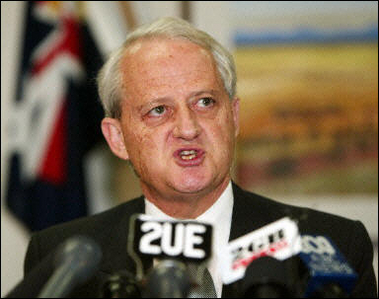|
AP: UN panel disputes oil-for-food firing
(AP)
Updated: 2005-11-11 08:55
A U.N. appeals body ruled that the only employee to be fired over the Iraq
oil-for-food scandal did not violate staff rules and should be reinstated with a
public apology from Secretary-General Kofi Annan, according to documents
disclosed Thursday.
The Joint Disciplinary Committee concluded that Joseph Stephanides was fired
mostly because of the public scrutiny from an investigation that found the $64
billion program was poorly managed and corrupt.
The ruling, obtained by The Associated Press, said the three-judge panel
"sympathized with the applicant's argument that he was being made the
'sacrificial lamb' in this matter so as to give the impression to the world that
concrete and decisive action was being taken."
The committee is an internal review body composed of U.N. staff where
employees punished by the world body can file appeals.
Annan is not required to accept the ruling, but will face pressure to act
upon it from within the U.N. system and staff who believe criticism over the
oil-for-food scandal was largely a smear campaign by the United Nations'
critics.
The ruling will be a new jolt to the secretary-general and the U.N. as they
try to move on from the oil-for-food scandal and other problems — including sex
abuse by peacekeepers and claims of sexual harassment by the former U.N. refugee
chief — that have made this year one of the worst chapters in the world body's
60-year history.

Attorney-General Philip Ruddock, seen here,
said the Australian government has appointed a commission of inquiry into
the alleged involvement of the country's monopoly wheat exporter in the
oil-for-food scandal in Iraq.
[AFP/file] | Stephanides, who was accused of divulging bidding information related to an
oil-for-food contract to Britain, had argued he was acting under the
instructions of a U.N. Security Council sanctions committee.
The 60-year-old Cypriot national had been scheduled to retire four months
after Annan fired him.
"This recommendation enables me to have an honorable retirement which I
really feel grateful for, nothing is more important than this," Stephanides told
AP.
If Annan does not act on the decision by Monday, 30 days after the ruling was
made, Stephanides can demand a copy and go directly to the next appeals body,
the U.N. Administrative Tribunal. Its decisions are binding.
A senior U.N. official said a response was imminent even though Annan was on
a trip to the Middle East. The official, who spoke on condition of anonymity
because the ruling was not yet public, said Annan's advisers were reconsidering
whether the punishment was too severe.
The committee concluded that the order to dismiss Stephanides be rescinded,
that he be paid any salary he missed and that he be allowed to retire. It also
ruled that he be paid the equivalent of two years net base salary — which he
said was about $98,000 — because of the damage to his rights, reputation and
image.
Finally, Annan must write him a public apology.
Annan fired Stephanides on May 31, four months after the U.N.-backed probe of
the program, led by former Federal Reserve Chairman Paul Volcker, accused him of
tainting the bidding process over a contract to inspect goods going into Iraq.
The committee said Stephanides favored Britain-based Lloyd's Register
Inspection Ltd., enlisting Britain's help and sharing bid information over the
contract in 1996. Lloyd's eventually won the contract. Stephanides claims that
the process was politicized from the start.
The ruling agreed that Annan didn't give enough weight to the oil-for-food
program's complexity and "highly politicized nature," by which the U.N. Security
Council wanted to spread contracts among various member states.
On Stephanides' request, Volcker reopened his investigation into Stephanides
over the summer. But Volcker's team reaffirmed its findings in a final report in
late October.
The ruling swept aside the findings of both Volcker's $35 million
investigation and concurring opinions by the U.N. Office of Human Resources
Management and Office of Legal Affairs.
The panel focused on a little-noticed sentence from the Volcker committee's
February interim report, which said the bids for the contract had been read out
publicly before Stephanides approached the British.
Stephanides was fired for divulging the bid amount of a Lloyd's competitor.
But because of the open reading, the bids were no longer private, the panel
said, adding the basis for firing Stephanides was "seriously flawed and was
therefore to be rejected."
The ruling went on to find that Annan's legal team committed "errors of law
and fact" in their handling of the case. It said Annan's lawyers cited the wrong
rules when they fired Stephanides and wrongly suspended him before informing him
of the charges against him.
Stephanides is the only U.N. employee to be punished over the scandal. Benon
Sevan, the program's former chief, is being investigated by the Manhattan
District Attorney's office for allegedly accepting kickbacks. Alexander
Yakovlev, who worked in the U.N. contract office, resigned and pleaded guilty in
August to soliciting a bribe from a company seeking a
contract.
|